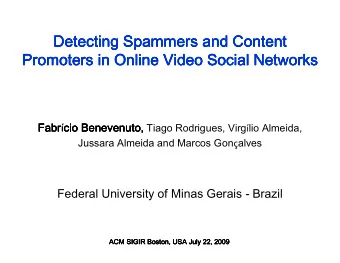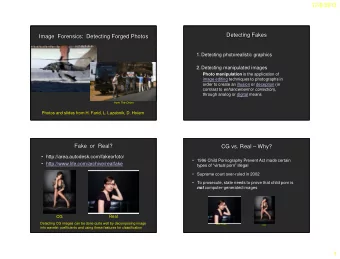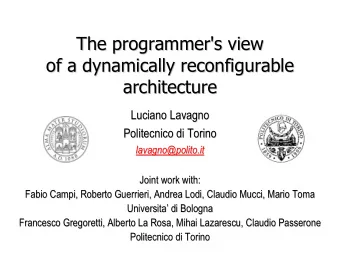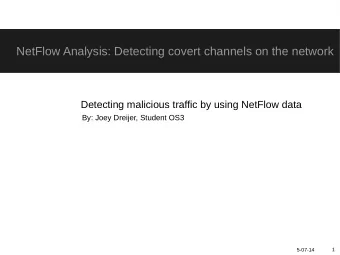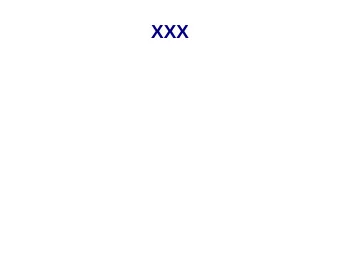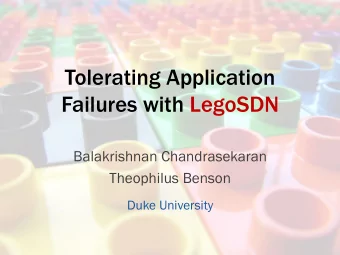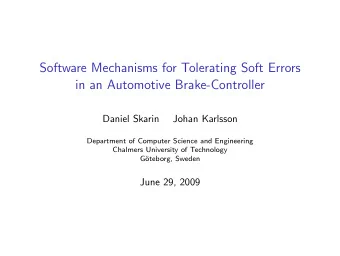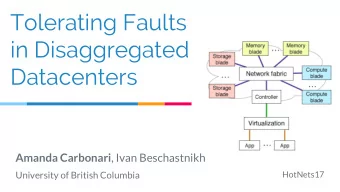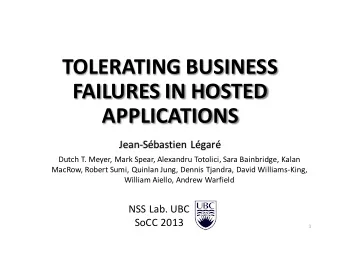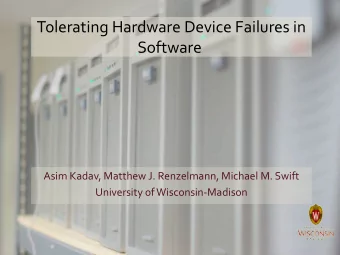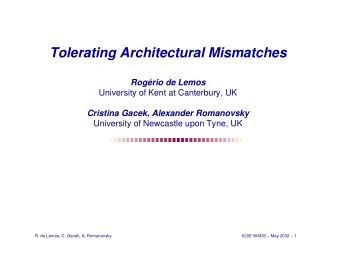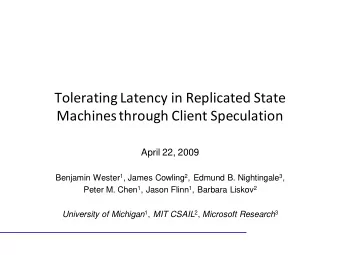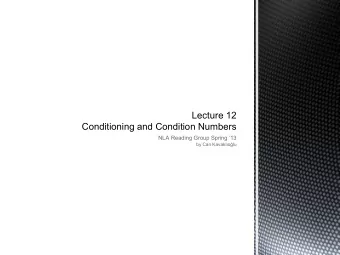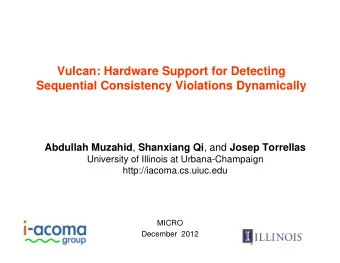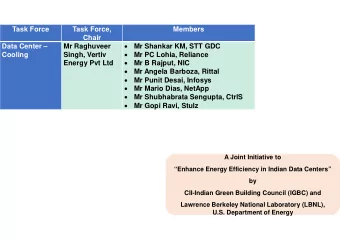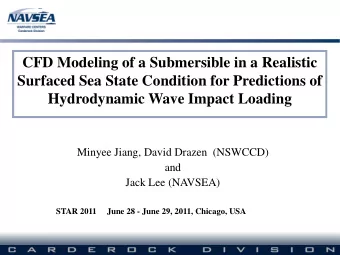
Dynamically Detecting and Tolerating IF-Condition Data Races - PowerPoint PPT Presentation
Dynamically Detecting and Tolerating IF-Condition Data Races Shanxiang Qi (Google), Abdullah Muzahid (University of San Antonio), Wonsun Ahn , Josep Torrellas University of Illinois at Urbana-Champaign HPCA-2014, Feb 2014 Background: Data
Dynamically Detecting and Tolerating IF-Condition Data Races Shanxiang Qi (Google), Abdullah Muzahid (University of San Antonio), Wonsun Ahn , Josep Torrellas University of Illinois at Urbana-Champaign HPCA-2014, Feb 2014
Background: Data Races • A data race is a pair of concurrent (unordered)accesses where at least one is a write • It is often a symptom of a concurrency bug • Conventional data race detection – Happens-before: detect unordered accesses using a vector clock – Lock-set: detect concurrent accesses by comparing set of locks acquired by each thread • Suffers from inaccuracy and high overhead 2
Motivating Example: Valgrind on FMM with 8 threads • Inaccuracy discourages use by programmers • High overhead lengthens debug cycle and precludes on-site deployment 3
Data Races in the Wild • Studied characteristics of data races that were actually reported as concurrency bugs Reported Data Bugs Races 4
Data Races in the Wild • Collected 54 races from Apps. Description open source bug Apache Web Server Server libraries and reports Database MySQL sever ➡ servers Desktop Mozilla Browser ➡ desktop apps Pbzip2 Parallel bzip2 ➡ runtimes & libraries & libraries Runtimes Redhat glibc library 38 out of 54 races were JAVA SDK IF-condition Data Races 5
IF-Condition Data Race (ICR) 1. Modification of IF condition T1 T2 variables in the middle of IF body if (p == q) { 2. Due to a racy write to the variable p = r; by another thread *p = x; } • Almost always a bug since it violates invariance of condition while executing control dependent code Almost no false positive bugs • Very easy to pattern-match in the source code No need for profiling to insert runtime checks • Amenable to low overhead detection 6
Contributions • Identified a novel class of inherently harmful data races called IF-Condition Data Race (ICR) • Proposed two new techniques for handling ICRs accurately and efficiently – SW-IF : Software-only implementation, ICR detection – HW-IF : Software + hardware implementation, ICR avoidance 7
SW-IF • Main Idea: – Compiler inserts runtime checks to detect ICRs • Two steps: Add Confirmation & Add Delay – Confirmation: Recomputation of IF condition at the end of the THEN and ELSE clauses to detect modification – Delay: (Optional) sleep to change timing during stress testing 8
SW-IF Example T1 T2 if (p == q) { (Optional)Delay usleep(15); p = r; *p = x; Confirmation if (p != q) printf (“bug!”); } • Use: – Bug detection during the debug phase – Efficient enough to be used in production code 9
Adding Confirmations T1 T2 • E – control expression if (p == q) { • E(L) – the set of all locations accessed in E • p = r; E(SL) – the set of shared q = …; locations accessed in E *p = x; • In the example, E is (p == q), if (p != q) printf (“bug!”); E(L) is {p, q}, and E(SL) is {p} } • Instrumentation Rules: – E(SL) should not be empty – E should not contain write operations (since recomputation of E will cause side effects) – Insert confirmations in the THEN and ELSE clauses: 1) at the end, or 2) before first write to E(L) 10
HW-IF • Main Idea: – Compiler marks shared locations in IF conditions for monitoring – HW prevents external accesses to monitored locations • Add Watch & Unwatch for each location in E(SL) – Watch instruction: Begins HW monitoring of location at start of IF body – Unwatch instruction: Finishes HW monitoring of location at end of IF body 11
HW-IF Example T1 T2 Begin Monitoring Watch (p); if (p == q) { p = r; *p = x; Finish } Monitoring Unwatch (p); • Use: – Bug avoidance in production code 12
HW-IF Hardware Operation P2 P1 Watch ( var ); var = … if ( var ) external access invalidate register watched vars watched vars Nack Tag (cache line addr) Proc. ID Cache line addr of var P1 Address Watch Table(AWT) 13
Limitations of SW-IF and HW-IF False Negative False Positive (Failure to Detect ICR) (Incorrect Detection of ICR) SW-IF Occasional: Very Rare (refer to paper) • Writes in E prevent a confirmation from being inserted • Writes to E(L) inside the THEN / ELSE clauses force confirmation to be placed early HW-IF Very Rare (refer to paper) Harmless (since spurious Nacks only cause delays): • False sharing in the AWT Nacks unrelated requests 14
Potential Bug Detection Capability • Analyzed ICR bugs in our bug database of open source apps HW-IF • Estimate: • HW-IF detects 100% of bugs SW-IF • SW-IF detects 47% of bugs Due to false negatives 47% 15
Evaluation Setup • Cetus source-to-source compiler – Instruments Confirmation & Delay, Watch & Unwatch • SW-IF : Ran natively on Xeon multi-socket machine • HW-IF : Ran on SESC simulator – Added 100-entry AWT – 8 processor CMP with snoopy MESI protocol • Applications – For performance: SPLASH-2 with 4-8 threads – For bug detection capability: Cherokee and Pbzip 16
New ICR Bugs Detected • Ran Cherokee and Pbzip with SW-IF and HW-IF • HW-IF found 5 unreported bugs • SW-IF found 3 of them – False negatives due to writes in IF condition 17
Execution Time Overhead of SW-IF • Negligible average overhead: SW-IF (2%), SW-IFdelay (6%) 18
Execution Time Overhead of HW-IF • HW-IF can avoid ICRs with negligible overhead of <1% on avg. • Slight increase in overhead with more processors 19
Also in the paper • Deadlock Handling • Support for Context Switching • Support for Multithreaded Processors • Characterization of IF Statements in Applications • Discussion on Double Checked Locking Bugs 20
Conclusion • Identified a novel class of data races called IF- condition data races (ICRs) – Inherently harmful – Relatively frequent – Easy to pattern-match in the source code – Amenable to low overhead detection / avoidance • Proposed two solutions that can be used for both development and production code – SW-IF : software-only solution to detect ICRs – HW-IF : software + hardware solution to avoid ICRs 21
Dynamically Detecting and Tolerating IF-Condition Data Races Shanxiang Qi (Google), Abdullah Muzahid (University of San Antonio), Wonsun Ahn , Josep Torrellas University of Illinois at Urbana-Champaign
Recommend
More recommend
Explore More Topics
Stay informed with curated content and fresh updates.
